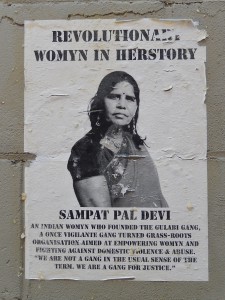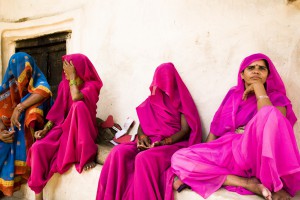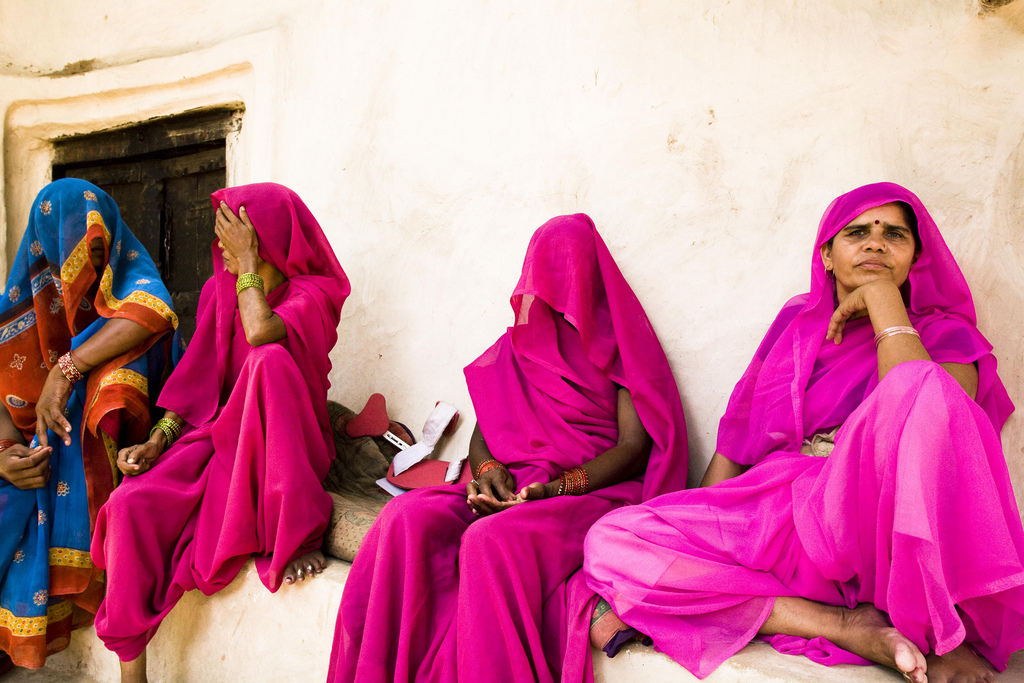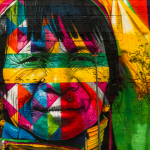“An eye for an eye only ends up making the world blind” This quote by India´s most famous social leader Mahatma Ghandi, shaped India´s fight for independence. But times have changed and in the current battle of India´s women, the approach of peaceful opposition seems to lead nowhere. Again and again western media and people are shocked by the violent crimes against women, be it the gang rape of two women by the seven coworkers of their husband and son or stories of the suffering of child brides. Despite having passed various laws against inequalities and being led by female president Prathiba Patil until 2012, India seems to be unable to win the battle against sexism and domestic violence.
A group of women in Bundelkhand, one of India´s poorest regions, is fighting against violence and corruption in their life with an approach that Gandhi might not have been fond of. These women take their fate in their own hands and stand up against rape, abuse and exploitation with the same violence that is used against them.
They call themselves the Gulabi Gang, which translates to the pink gang. Pink is a colour not used by any religion or political party and was therefore chosen by the gang´s leader Sampat Pal Devi; a  child bride, married at only eleven herself, mother of five and basically illiterate, she is the heart and the voice of the over 20 000 women, who are part of the gang today. Since her early childhood Sampat´s interest in equality and justice has shaped her life. After making her brothers show her how to read and write basic words, she persuaded her parents to send her to school as well. Even though she only completed four years of education, this is still more than most young girls in the rural areas of India achieve. While she only formed the actual gang in 2006, by giving them a uniform and a name to gain more influence, she understood the power of many long before that and motivated women to stand up against their abuse united, as a gang for justice.
child bride, married at only eleven herself, mother of five and basically illiterate, she is the heart and the voice of the over 20 000 women, who are part of the gang today. Since her early childhood Sampat´s interest in equality and justice has shaped her life. After making her brothers show her how to read and write basic words, she persuaded her parents to send her to school as well. Even though she only completed four years of education, this is still more than most young girls in the rural areas of India achieve. While she only formed the actual gang in 2006, by giving them a uniform and a name to gain more influence, she understood the power of many long before that and motivated women to stand up against their abuse united, as a gang for justice.
Quite an ambitious goal for the women, who usually have no access to education and in majority stem from the lowest caste, the untouchables, living in the poor villages, far away from the capital New-Delhi. India´s old caste system stems from Brahminical texts and grouped the population in four casts: Brahmins (priests and religious high class), Kshatriyas (political leaders, rulers and the military), Vaishyas (merchants and farmers) and Sudrahs (the assistants and servants to the other castes). Excluded from this caste system and at the bottom of India´s social and economic system, stand the Dalits or untouchables. Even though the caste system has no legal support in India´s law and discrimination against members of lower caste is a crime anchored in the constitution, discrimination against and exploitation of Dalits is still taking place, especially in the rural areas.
“Nobody comes to our help in these parts. The officials and the police are corrupt and anti-poor. So sometimes we have to take the law in our hands.” tells Sampat Pal the BBC. Next to corruption, bribery and misinformation for example about governmental aid, the unawareness about their rights is a big problem for many low caste Indians. Sampat and her gang members, who often face combined discrimination not only for being a woman but also an untouchable, stand up against domestic violence, forced marriages and rape. Sampat takes a leading role in all of the missions, as the figurehead and spokesperson of the Gulabis. Her charisma and convincing speeches are often enough to solve the problems. Even though the Gulabi Gang achieved public interest through using pink bamboo sticks (laathis), the traditional self-defence weapon of India, to beat unsagacious husbands and ward of police officers, they try to solve all problems with open communication first. “When I go around with a stick, it’s to make men fear me. I don’t always use it, but it helps change the mind of men who think they are more powerful than me.” The gang´s real power, much like the Indian elephant, stems from their size.
Their activities range from helping old women to get their pension, threatening corrupt officials, making sure food rations reach the right people, stopping forced marriage, domestic abuse and the exploitation of women by their husbands and in-laws. And if reaching those goals means hijacking food transporters or beating policemen they will do it. With the help of funders all over the world the gang even managed to open a school in order to start with the trigger of many problems: missing education. Teaching not only math, reading and writing, but also sowing, the school makes sure their students will later on be able to make their own basic income. School uniform and even chalk are – of course – pink.
The reaction to the womens´ activism by men is surprisingly positive. “Let good come, be it through men or through women. We have to survive” says one of the men, attending the recruiting of new members. Another one claims: “I feel if we support the Gulabi Gang there will be great progress in our village.” A number of men now also take part in the gang and support their wives.
Their influence and attraction did not go unnoticed, not only by various local and international newspapers, authors and film makers, but also by India´s political parties. Sampat Pal was invited by a number of representatives to join them, but until today did not choose to step up to that. Luckily for the Gulabi Gang one might say, as it is not easy to see where the movement will go without her. Currently there is no obvious successor for their  leader and the gang is highly dependent on her influence and name. Sampat Pal encourages and strengthens the other members, however especially in film scenes showing the gang large differences in their attitude are visible. Most of the women are happy to leave the stage to their charismatic leader and the question, if this gang will be able to survive and keep influence without her, must come to mind. Finding a follow up proved to be hard for Sampat since the respect she has gained in the villages usually come from her persistent and open character. She does not back down and she keeps insisting on her and others´ rights. Sampat´s passion and persistency are rather unique and the large amounts of time she spends revisiting officials and families again and again are honourable. In such a corrupted state as India without constant control the walls she brought down, could soon be built up again.
leader and the gang is highly dependent on her influence and name. Sampat Pal encourages and strengthens the other members, however especially in film scenes showing the gang large differences in their attitude are visible. Most of the women are happy to leave the stage to their charismatic leader and the question, if this gang will be able to survive and keep influence without her, must come to mind. Finding a follow up proved to be hard for Sampat since the respect she has gained in the villages usually come from her persistent and open character. She does not back down and she keeps insisting on her and others´ rights. Sampat´s passion and persistency are rather unique and the large amounts of time she spends revisiting officials and families again and again are honourable. In such a corrupted state as India without constant control the walls she brought down, could soon be built up again.
By Céline Sonnenberg
Image Credit:
Picture 1: Michael Coghlan, licensed under CC BY-SA 2.0
Picture 2: Allessandro de Tufo, licensed under CC BY-ND 2.0










